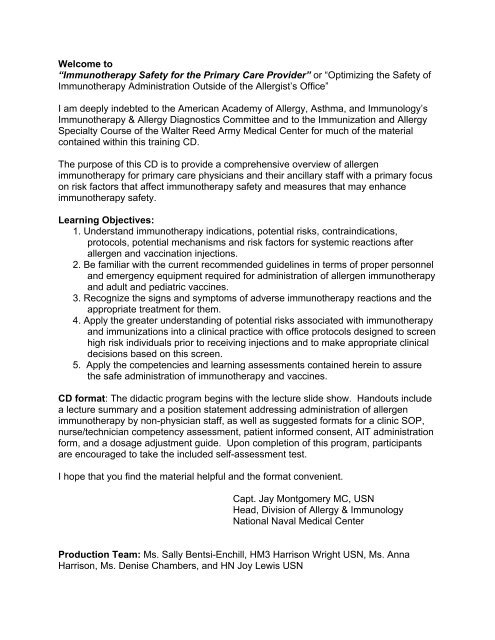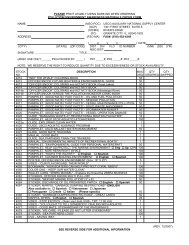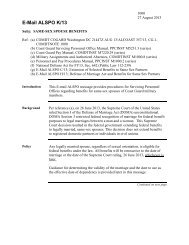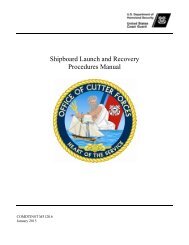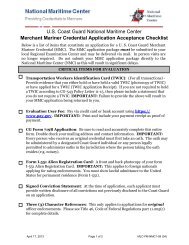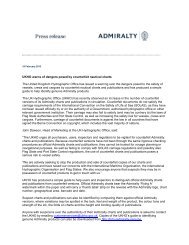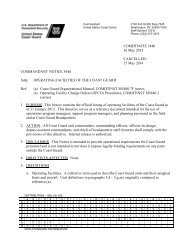Immunotherapy Safety for the Primary Care ... - U.S. Coast Guard
Immunotherapy Safety for the Primary Care ... - U.S. Coast Guard
Immunotherapy Safety for the Primary Care ... - U.S. Coast Guard
Create successful ePaper yourself
Turn your PDF publications into a flip-book with our unique Google optimized e-Paper software.
Welcome to<br />
“<strong>Immuno<strong>the</strong>rapy</strong> <strong>Safety</strong> <strong>for</strong> <strong>the</strong> <strong>Primary</strong> <strong>Care</strong> Provider” or “Optimizing <strong>the</strong> <strong>Safety</strong> of<br />
<strong>Immuno<strong>the</strong>rapy</strong> Administration Outside of <strong>the</strong> Allergist’s Office”<br />
I am deeply indebted to <strong>the</strong> American Academy of Allergy, Asthma, and Immunology’s<br />
<strong>Immuno<strong>the</strong>rapy</strong> & Allergy Diagnostics Committee and to <strong>the</strong> Immunization and Allergy<br />
Specialty Course of <strong>the</strong> Walter Reed Army Medical Center <strong>for</strong> much of <strong>the</strong> material<br />
contained within this training CD.<br />
The purpose of this CD is to provide a comprehensive overview of allergen<br />
immuno<strong>the</strong>rapy <strong>for</strong> primary care physicians and <strong>the</strong>ir ancillary staff with a primary focus<br />
on risk factors that affect immuno<strong>the</strong>rapy safety and measures that may enhance<br />
immuno<strong>the</strong>rapy safety.<br />
Learning Objectives:<br />
1. Understand immuno<strong>the</strong>rapy indications, potential risks, contraindications,<br />
protocols, potential mechanisms and risk factors <strong>for</strong> systemic reactions after<br />
allergen and vaccination injections.<br />
2. Be familiar with <strong>the</strong> current recommended guidelines in terms of proper personnel<br />
and emergency equipment required <strong>for</strong> administration of allergen immuno<strong>the</strong>rapy<br />
and adult and pediatric vaccines.<br />
3. Recognize <strong>the</strong> signs and symptoms of adverse immuno<strong>the</strong>rapy reactions and <strong>the</strong><br />
appropriate treatment <strong>for</strong> <strong>the</strong>m.<br />
4. Apply <strong>the</strong> greater understanding of potential risks associated with immuno<strong>the</strong>rapy<br />
and immunizations into a clinical practice with office protocols designed to screen<br />
high risk individuals prior to receiving injections and to make appropriate clinical<br />
decisions based on this screen.<br />
5. Apply <strong>the</strong> competencies and learning assessments contained herein to assure<br />
<strong>the</strong> safe administration of immuno<strong>the</strong>rapy and vaccines.<br />
CD <strong>for</strong>mat: The didactic program begins with <strong>the</strong> lecture slide show. Handouts include<br />
a lecture summary and a position statement addressing administration of allergen<br />
immuno<strong>the</strong>rapy by non-physician staff, as well as suggested <strong>for</strong>mats <strong>for</strong> a clinic SOP,<br />
nurse/technician competency assessment, patient in<strong>for</strong>med consent, AIT administration<br />
<strong>for</strong>m, and a dosage adjustment guide. Upon completion of this program, participants<br />
are encouraged to take <strong>the</strong> included self-assessment test.<br />
I hope that you find <strong>the</strong> material helpful and <strong>the</strong> <strong>for</strong>mat convenient.<br />
Capt. Jay Montgomery MC, USN<br />
Head, Division of Allergy & Immunology<br />
National Naval Medical Center<br />
Production Team: Ms. Sally Bentsi-Enchill, HM3 Harrison Wright USN, Ms. Anna<br />
Harrison, Ms. Denise Chambers, and HN Joy Lewis USN


